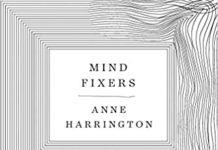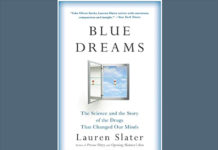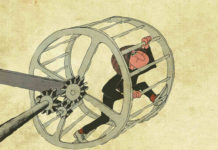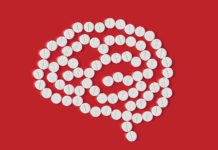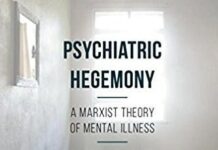Big Pharma Meets Big Diagnosis, Big Courts, and Big Psychiatric Hospitals
Gottstein’s book is The Pentagon Papers of the traditional mental health system, because he exposes a mind-blowing number and variety of cold-blooded, calculating actions on the part of Eli Lilly in trying to hide what it knew to be the devastating effects of its hugely profitable Zyprexa.
The Revolt Against Psychiatry: A Book Review
The focus of Bonnie Burstow’s new book, The Revolt Against Psychiatry, “is not the problems that psychiatry presents but the attempt to counter them.” Burstow asks, “What pressures might we bring to bear to loosen the grip of psychiatry? We habitually seem to be losing the battle; so how do we turn the situation around?”
A Doctor Cures His Bipolar Diagnosis Without Psychiatry: Review of ‘I’
I details what happened to Jeffrey Fidel when he quit psychiatric drugs and embraced an alternative, non-medical healing approach — a set of philosophical and spiritual teachings known as the Tao Te Ching and Hua Hu Ching.
An “Even-Handed” History of Psychiatry as Damning as the “Polemics”?
Where Professor Harrington's book seems to differ from books that others might call polemics is that she does not attribute nefarious motives to the psychiatric establishment. I worry that she underplays the ways in which the current model causes harm, but I support her suggestion for a retraction of psychiatry's scope.
Tough Love for Thomas Szasz: A Book Review
Dr. Thomas Szasz (1920-2012) was one of the greatest thinkers and prose stylists of the last 100 years. Enough time has passed since he died that we can start to take stock of his legacy. This important new collection of essays by former colleagues, psychiatrists, philosophers, and legal experts does just that.
Fighting the Suppression of Dissent: A Guidebook for Those Who Refuse to Conform
Political, educational, and mental health fields are joining forces in ever more powerful authoritarian rule. The DSM, proclaimed to be a scientific guidebook, is little more than a political instrument used to control undesirable behaviors and experiences. Who will fight for our rights when everybody is tranquilized into conformity?
Still Seeking a Chemical Cure After All These Years: Lauren Slater’s Blue Dreams
Blue Dreams offers a history of the development of psychiatric drugs, but is partly a memoir of the demise of the author's health during the decades she spent on psychiatric drugs. At the time of writing her memoir, Slater is not yet at the point of realizing that the mental health system is not a productive place to go for answers to depression.
From Picket Lines to Worry Lines
In Politics of the Mind: Marxism and Mental Distress, Iain Ferguson aims to use the marxist approach “not only to make sense of mental distress but also help us address and change the material conditions that give rise to it.” He begins by describing the ‘crisis in mental health’ that disproportionately affects the unemployed, poor, and oppressed.
New Book Takes Aim at the Mental Health Industrial Complex
I’ve been around the block a few times, so I was not shocked by the revelations in Art Levine’s absorbing and well-researched new book, Mental Health, Inc.: How Corruption, Lax Oversight and Failed Reforms Endanger Our Most Vulnerable Citizens. But I was certainly appalled.
Psychiatric Hegemony: A Marxist Theory of Mental Illness
In Psychiatric Hegemony: A Marxist Theory of Mental Illness, Bruce Cohen explains the expanding power and influence of psychiatry in terms of its usefulness to the capitalist system — the more useful it is, the more power it is given, and the greater its power, the more useful it becomes.
Searching for a Rose Garden: Challenging Psychiatry, Fostering Mad Studies
Searching for a Rose Garden:
Challenging Psychiatry, Fostering Mad Studies is a timely and unique collection of essays that should be of interest to anyone with personal experience with, or research interests in, mental difference, psychiatrization and its resistance.
A “Hot-Potato” Topic and a “Rational” Book
Rational Suicide, Irrational Laws is an excellent book that explores the criminalization and decriminalization of suicide. It analyzes laws by which “mental health” professionals and organizations are held accountable or “liable.” It exposes horrific contradictions in how laws are applied, particularly problematizing the assumption that people who kill themselves are suffering from a “mental illness.” There is much in this book that makes me want to stand up and cheer.
Book Review: Psychiatry Reconsidered
Hugh Middleton, MD, Associate Professor at the School of Sociology and Social Policy, University of Nottingham, and NHS Consultant Psychiatrist, Nottinghamshire Healthcare NHS Trust has written an interesting and worthwhile book, “Psychiatry Reconsidered, From Medical Treatment to Supportive Understanding.” Dr. Middleton is co-founder of the Critical Psychiatry Network and this book could serve as the foundational textbook for our field. As his academic appointment would suggest, he has a decidedly social perspective on the kinds of problems that bring many people to a psychiatrist’s attention, but in this book he offers eloquent discussions of many perspectives that inform our field. It is remarkable that in this 200 page text, he is able to cover so many topics – diagnosis, pharmacotherapy, schools of psychotherapy - with such clarity.
Book Review: “Overmedicated and Undertreated”
A former pharma executive has broken ranks with the industry in a new book by reporting how multiple psychiatrists, schools, and his desperate hopes pressed him to allow higher and higher doses of antipsychotic medications. The result: his 15-year-old son's death from Seroquel.
Series on Anti-Psychiatry and Critical Theory for World Mental Health Day
To coincide with World Mental Health Day on October 10th, 2015, Verso Books, the largest independent and radical publishing house released a series of blogs on mental health and critical and antipsychiatry. The posts include pieces on R.D. Laing, colonialism, women’s oppression, delusions and art, “The Happiness Industry,” and social and institutional oppression.
New Book: Deadly Psychiatry And Organised Denial
Writing for the UK’s Daily Mail, Peter Gøtzsche introduces his new book “Deadly Psychiatry And Organised Denial.” “More than 80 million prescriptions for psychiatric drugs are written in the UK every year, Gøtzsche writes. “Not only are these drugs often entirely unnecessary and ineffective, but they can also turn patients into addicts, cause crippling side-effects - and kill.”
Book Review: Psychiatry in Context: Experience, Meaning & Communities, by Phil Thomas
Psychiatry in Context follows on from Phil Thomas’s previous ground-breaking analysis Postpsychiatry (Bracken & Thomas, 2005), and is set to become just as influential and indispensable to anyone concerned with the politics, practice, and philosophy of mental health. In some respects this is almost ironic, because a book like Psychiatry in Context would ideally be unnecessary.
Psychiatry and the Business of Madness: An Ethical and Epistemological Accounting
Normally when I write a book review, I include some quotes from the work to enable readers to judge for themselves the quality and content of the material. With Psychiatry and the Business of Madness, however, this presented a problem, in that virtually every one of the 264 pages of text contains eminently quotable material.
“So You’ve Been Publicly Shamed”
-A review of Jon Ronson's new book exploring the rising power of social media to reinforce social norms.
“Emerging Ideas in Brain Science”
In Metapsychology Online Reviews, Roy Sugarman discusses the latest Cerebrum Anthology, which examines "Emerging Ideas in Brain Science." The book, Sugarman writes, covers topics...
A Lifetime of Personal Lessons from Raising an Autistic Child
The Lancet Psychiatry has a book review of Ron Suskind's memoir of raising his autistic son, Life, Animated: A Story of Sidekicks, Heroes, and...
“Can psychedelic trips cure PTSD and other maladies?”
The Washington Post explores some of the history of research into the therapeutic potentials of even just one session with a psychedelic drug, and...
“Doctors Tell All—and It’s Bad”
In The Atlantic, Meghan O'Rourke reviews a number of recent books authored by physicians and finds they're all talking about "a corrosive doctor-patient relationship...
Sunday Exhibit: Photos of Abandoned Asylums
UK photographer Mark Davis spent six years traveling to abandoned former Victorian-era mental institutions and researching their histories and photographing them for his new...
“High-volume Care, Not Good Care”
WSJ Live interviews cardiologist Dr. Sandeep Jauhar about his new book, Doctored: The Disillusionment of an American Physician. Jauhar describes "the perverse incentives of...




